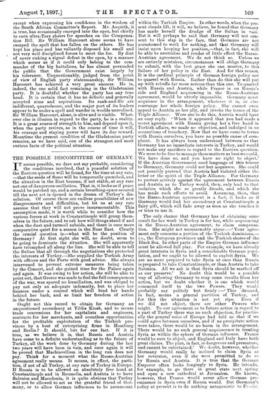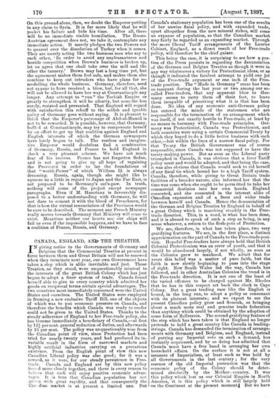THE POSSIBLE DISCOMFITURE OF GERMANY.
IT seems possible, we dare not say probable, considering the conditions involved, that a peaceful solution of the Eastern question will be found, for the time at any rate, —that the seeds of flame will be temporarily quenched, and the situation in the East become, if not stable, at any rate not one of dangerous oscillation. That is, it looks as if peace would be patched up, and a certain breathing-space secured till the next act is opened in the drama of Turkey's dis- solution. Of course there are endless possibilities of new disagreements and difficulties, but let us at any rate assume that they will not prove insurmountable. This assumption made, it is worth while to consider how the various forces at work in Constantinople will group them- selves in the future, and to ask how will things stand if and when the dust and turmoil subside, and there is once more comparative quiet for a season in the Near East. Clearly the crucial question is—what will be the position of Germany? At first sight she will, no doubt, seem to be going to dominate the situation. She will apparently have triumphed all along the line. She will be able to tell the Sultan that all through the negotiations she protected the interests of Turkey.—She supplied the Turkish Army with officers and the Porte with good advice. She always intervened to prevent extreme measures being taken by the Concert, and she gained time for the Palace again and again. It was owing to her action, she will be able to point out, that Greece was made to feel the full consequences of the war, was spared no humiliation, and was obliged to pay not only an adequate indemnity, but to place her finances under a control which will bind her hands behind her back, and so limit her freedom of action in the future.
Ought not this record to obtain for Germany an unquestioned ascendency at Yildis Kiosk, and to secure trade concessions for her capitalists and engineers, contracts for her merchants, and countless opportunities for the profitable exploitation of the Turkish pro- vinces by a host of enterprising firms in Hamburg and Berlin? It should, but for one fact. If it is true, as we believe it is, that Russia and Austria have come to a definite understanding as to the future of Turkey, all the work done by Germany during the last two years will have been in vain, and once again it will be proved that Machiavellism in the long run does not pay. Think for a moment what the Russo-Austrian agreement really means. It means, in effect, the parti- tion, if not of all Turkey, at any rate of Turkey in Europe. If Russia is to be allowed an absolutely free hand at Constantinople and. in Roumelia, and Austria is to have Salonica, and Macedonia, it is quite obvious that Turkey will not be allowed to act as the grateful friend of Ger- many, or to allow German influences to be paramount within the Turkish Empire. In other words, when the pre- sent clouds lift, it will, we believe, be found that Germany has made herself the drudge of the Sultan in But it will perhaps be said that Germany will not con- sent to this slap in the face, that Germans are not accustomed to work for nothing, and that Germany will insist upon keeping her position,—that, in fact, she will be able to neutralise and render of little effect the Russo- Austrian agreement. We do not think so. Unless we are entirely mistaken, circumstances will oblige Germany to submit, with the best grace she can muster, to this failure of her policy in the East. And for this reason. It is the cardinal principle of German foreign policy not to quarrel with Russia. Rather than do this she will put up with rebuffs far more serious than this one. To quarrel with Russia and Austria, while France is on Russia's side and England acquiescing in the Russo-Austrian agreement, would be utterly impossible. Germany must acquiesce in the arrangement, whatever it is, or else rearrange her whole foreign policy. She cannot even appeal to Austria as her ally, and invoke the terms of the Triple Alliance. Were she to do this, Austria would have an easy reply. When it appeared that you had made a secret agreement with Russia giving her a free hand in Turkish affairs, we made no objection, and indulged in no accusations of treachery. Now that we have come to terms with Russia ourselves, you have no possible cause of com- plaint. It has always been understood between us that Germany has no immediate interests in Turkey, and would not make any sacrifices in regard to the Eastern question. We were to be free to manage these matters as best we could. We have done so, and you have no right to object.' If the Austrian Government used language of this tenour to Germany, Germany could not but acquiesce. She could not possibly pretend that Austria had violated either the letter or the spirit of the Triple Alliance. For Germany to protest actively against the agreement between Russia and Austria as to Turkey would, then, only lead to that isolation which she so greatly dreads, and which she has made such efforts to avoid. Assuming, then, that the Russo-Austrian agreement is a fact, it looks as if Germany would find her ascendency at Constantinople a fairy gift, which will fade away as soon as she touches it or tries to use it.
The only chance that Germany has of obtaining some result for her work in Turkey is for her, while acquiescing in the Russo-Austrian agreement, to claim compensa- tion. She might not unreasonably argue :—' Your agree- ment only concerns a portion of the Turkish dominions,- i.e., the European provinces and the Turkish shores of the Black Sea. In other parts of the Empire German influence must be allowed full play. For example, we have already great interests in Syria and a considerable German popu- lation, and we ought to be allowed to exploit Syria. We are no more prepared to take Syria at once than Russia is prepared to take Constantinople, or than Austria to take Salonica. All we ask is that Syria should be marked off as our preserve.' No doubt this would be a possible way of allowing Germany to reap some results from her action, but we doubt whether it is one which would commend itself to the two Powers. They would probably say politely but firmly This demand, in fact, means a general partition of Turkey, and for this the situation is not yet ripe. Even if we did not object, there are other Powers who might. To our agreement as to future action in regard to a part of Turkey there was no such objection, for practic- ally the general voice of Europe had told us that if we could agree between ourselves, and if no precipitate action were taken, there would be no harm in the arrangement. There would be no such general acquiescence in treating Syria as within the sphere of German influence. France would be sure to object, and England and Italy have both great claims. The plan, in fact, is dangerous and premature, and cannot be entertained.' We doubt, however, whether Germany would really be inclined to claim Syria as her reversion, even if she were permitted to do so by Russia and Austria. It is true that the German Emperor often looks longingly to Syria. He intends, for example, to go there in great state next spring and open a new cathedral at Jerusalem. He knows, however, that France would never allow German pre- eminence in Syria, even if Russia would. But Germany's policy at present is to do nothing antagonistic to Prince. On this ground alone, then, we doubt the Emperor putting in any claim to Syria. It is far more likely that he will pocket his failure and bide his time. After all, there will be no immediate visible humiliation. The Russo- Austrian agreement does not, we take it, contemplate any immediate action. It merely pledges the two Powers not to quarrel over the dissolution of Turkey when it comes. They are merely acting like two business men who say to each other, In order to avoid any unpleasantness and hostile competition when Brown's business is broken up, let us agree that one shall take over the mill and the other the tannery.' Brown may last a long time yet, but the agreement makes them feel safe, and makes them also combine to keep out intruders who have plans for re- modelling the whole business. Germany, therefore, need not appear to have received a blow, but, for all that, she will not be allowed to have her way at Constantinople any longer. Any attempt to "run" the Turkish Empire or greatly to strengthen it will be silently, but none the less surely, resisted and prevented. That England will regard with satisfaction this rebuff to the selfish and ignoble policy of Germany goes without saying. It is pleasant to think that the Emperor's patronage of Abd-ul-Hamid is not to be rewarded. It is possible, however, that Germany, baffled at Constantinople, may try to compensate herself by an effort to get up that coalition against England and English interests of which the German newspapers have lately begun to talk. The restless and imagina- tive Emperor would doubtless find a combination of Germany, Russia, and France to hold England in check a very pleasant scheme. We have not much fear of his success. France has not forgotten Sedan, and is not going to give up all hope of regaining the Provinces in order to lay the foundations of that "world-Power" of which William II. is always dreaming. Russia, again, though she might like to squeeze us a little in regard to Japan and the Far East, is not prepared to be Germany's cat's-paw. In truth, nothing will come of the project except newspaper paragraphs. Even if M. Hanotaux is favourably dis- posed to a better understanding with Germany, he will not dare to cement it with the blood of Frenchmen, for that is how the virtual renunciation of the Provinces would be sure to be described. The moment any French Ministry really moves towards Germany that Ministry will cease to exist. Meantime neither our hearts nor our ships will fail us even if the impossible happens, and we have to face a coalition of France, Russia, and Germany.



































 Previous page
Previous page